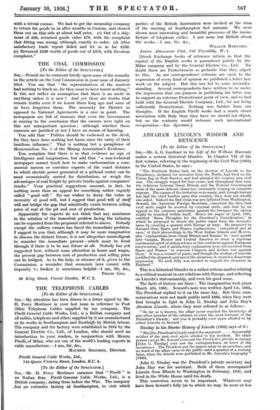THE COAL COMMISSION [To the Editor of the SPECTATOR.]
SIR,—Permit me to comment briefly upon some of the remarks in the article on the Coal Commission in your issue of January 23rd. You say that "the representatives of the masters had nothing to teach us, for they seem to have learnt nothing." (Is this not rather an assumption that there is no merit in anything unless it is new ? And yet there are truths that remain truths even if we learnt them long ago and some of us have forgotten them. The necessity for District as opposed to National Agreements is a case in point. The !newspapeas are full of rumours that even the Government is coming to the conclusion that the owners were right on this not unimportant question ; although whether those rumours are justified or not I have no means of knowing.
You add that "Politics should be eschewed as the devil, for they have done nothing but harm since the entry of their insidious influence." That is nothing but a paraphrase of Memorandum No. 1 of the Mining Association's Evidence.
You complain that there is in that evidence no sign of intelligence and imagination, but add that "a non-technical newspaper cannot teach how to make carbonization a com- mercial success or convince experts of the exact distance to which electric power generated at a pithead centre can be most economically carried for distribution, or weigh the advantages of coal freight by private trucks against companies' trucks." Your practical suggestions amount, in fact, to nothing more than an appeal for something rather vaguely called "good will." No one wishes to decry the value or necessity of good will, but I suggest that good will of itself will not bridge the gap that admittedly exists between selling price of coal at the pit and cost of production.
Apparently the experts do not think that any assistance in the solution of the immediate problem facing the industry can be expected from the proposals referred to above. Nobody except the colliery owners has faced the immediate problem. I suggest to you that, although it may be more imaginative to discuss the distant future, it is not altogether unintelligent to consider the immediate present—which must be lived through if there is to be any future at all. Nobody has yet suggested how, without some alteration in hours and wages, the present gap between cost of production and selling price can be bridged. As to the help, or absence of it, given to the Commission, a reminder that economic laws cannot with impunity b broken is sometimes helpful—I am, Sir, &c., PHILIP GEE.
40 King Street, Covent Garden, W.C. 2.


















































 Previous page
Previous page